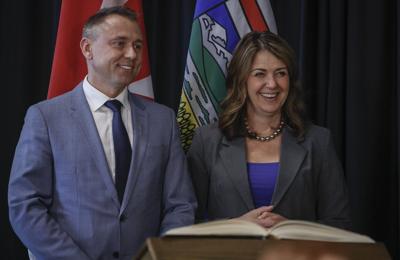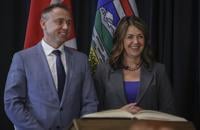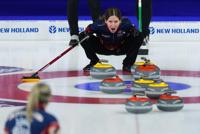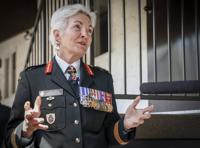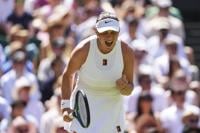EDMONTON - Alberta is rolling out new regulations this fall banning transgender athletes from playing women’s sports, but the province will still welcome out-of-province transgender competitors.
Tourism and Sport Minister Andrew Boitchenko said the discrepancy is out of his hands.
“We don't have authority to regulate athletes from different jurisdictions,” he said in an interview.
In a followup statement, ministry spokeswoman Vanessa Gomez added it's due to outside sporting organizations being bound by out-of-province or international guidelines.
She added the rules allow the government "to do what is best for Albertan athletes, while also showcasing Alberta as a premier destination for national and international sport events."
Starting Sept. 1, the province will block transgender athletes from Alberta who are 12 and older from competing in female amateur sports. It’s one of a suite of changes surrounding transgender health, education and sport introduced last year by Premier Danielle Smith’s United Conservative Party government.Â
The laws sparked polarizing debate.
Proponents, including Smith, say it’s about fairness on the playing field, so girls are not battling opponents with biological advantages. Detractors say it’s about stigmatizing and punishing those in the transgender community.
Hannah Pilling, a track athlete who petitioned in favour of restricting transgender people in female sports, has welcomed the new regulations. She said in an interview she hopes Smith’s government takes it further.
“It's kind of hard to enforce that on other athletes that are coming to compete in Alberta, but it's definitely still not completely fair,” Pilling said.
She added that she would like to see future rules apply to men's divisions.
Transgender athlete Allison Hadley said the exemption for out-of-province athletes suggests the legislation is not really about fairness or safety.
"If I had the resources to (move), honestly, I probably wouldn't be in Alberta now," she said. "We're here in a province that doesn't want us to be in the public or exist in many ways."
Hadley said she didn't pick up cross-country skiing to win medals. She said she was in it for the health benefits, the motivation that competition brings to her training and the camaraderie on the trail.
"It really sucks to have that taken away," she said.
Mark Kosak, head of the Alberta Colleges Athletic Conference, said a restriction preventing transgender athletes from coming to Alberta to compete might have stopped the organization from ever hosting a national championship again.
"So there's some relief from us," Kosak said.
He said the conference hosts more than 1,000 events a year and, of those, between 40 and 50 host out-of-province competitors.
He said he’s unaware of any transgender athletes competing in the conference.
Kosak added that the sporting community didn’t ask for the government’s new rules.
“This is not a priority. This is not a concern,” he said. “It's not an issue.”
The rules will be enforced through a complaint-driven process. Female athletes subject to complaints need to prove their sex registration at birth.
For those who were born elsewhere but live in Alberta and can’t retrieve documents that clearly state their sex at birth, Boitchenko said the government will look at “alternative documents.”
“We'll be looking at (it) case by case, making sure that nobody feels that they can't compete just because they lost certain documents,” he said.
Possible sanctions could be written warnings or code of conduct violations.
Bennett Jensen, legal director at LGBTQ+ advocacy group Egale, said the validation process alone is a "gross violation of the privacy of all women and girls.”
He said the government is introducing a complaint-based “snitch line” for complaints that will spur even more public policing of women's bodies and gender presentation among young girls — whether they’re transgender or not.
He said a 12-year-old, at a vulnerable stage of her life, could be subject to scrutiny and humiliation based on her physical appearance.
Jensen also said the government’s biological advantage argument falls apart in many instances, including for those athletes receiving hormone replacement therapy.
Boitchenko said inclusion is the goal, and the government is planning to expand grants to encourage sporting organizations to create coed divisions where numbers allow.
Pilling's father, Dave Pilling, said he sits on the board for the Southern Alberta Summer Games, where they introduced open categories in all sports this year.
But for the Alberta Colleges Athletic Conference, Kosak said creating coed divisions across the majority of sports is “totally impractical and unrealistic.”
This report by şĂÉ«tvwas first published July 12, 2025.

